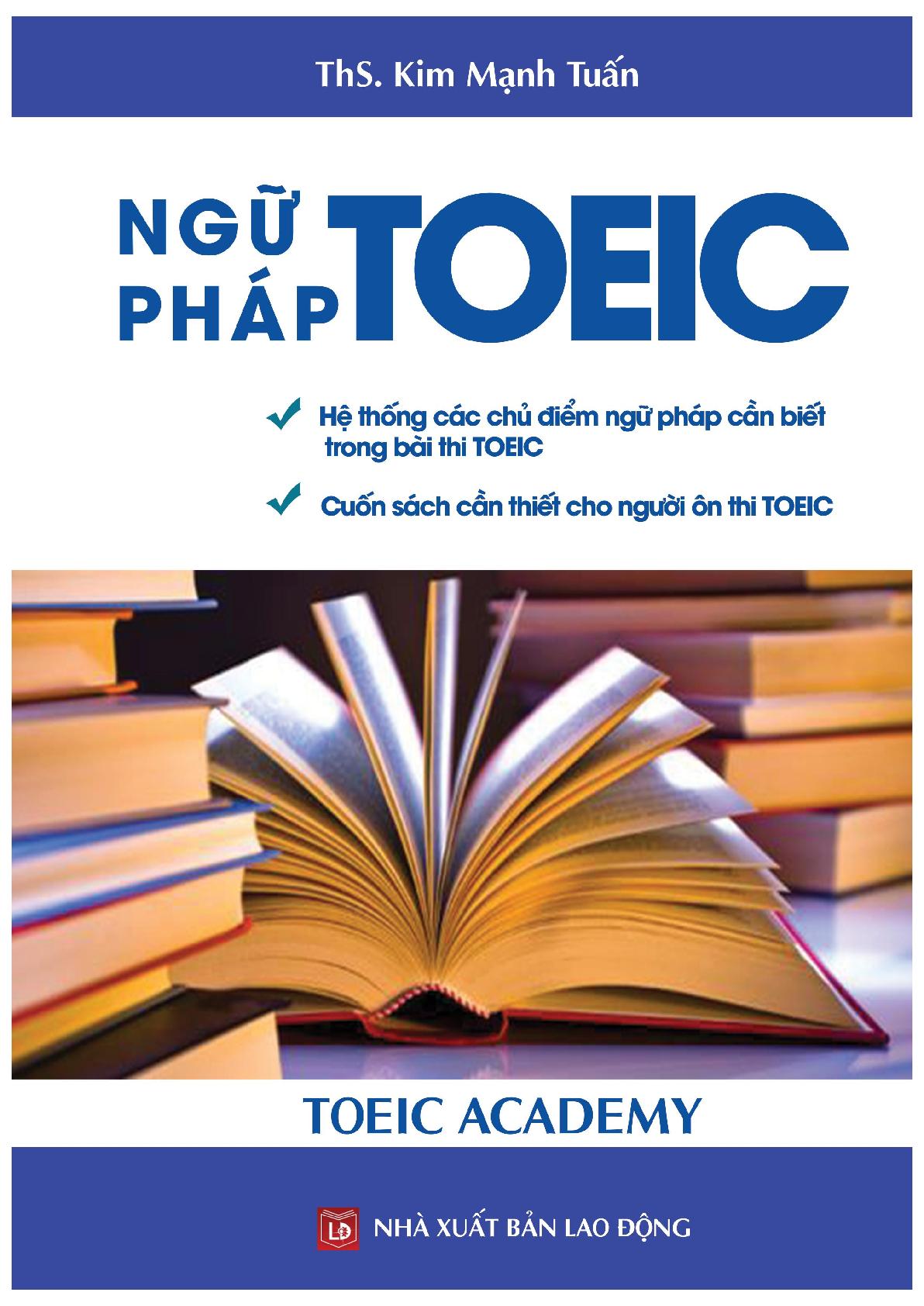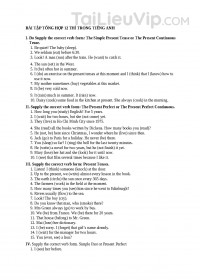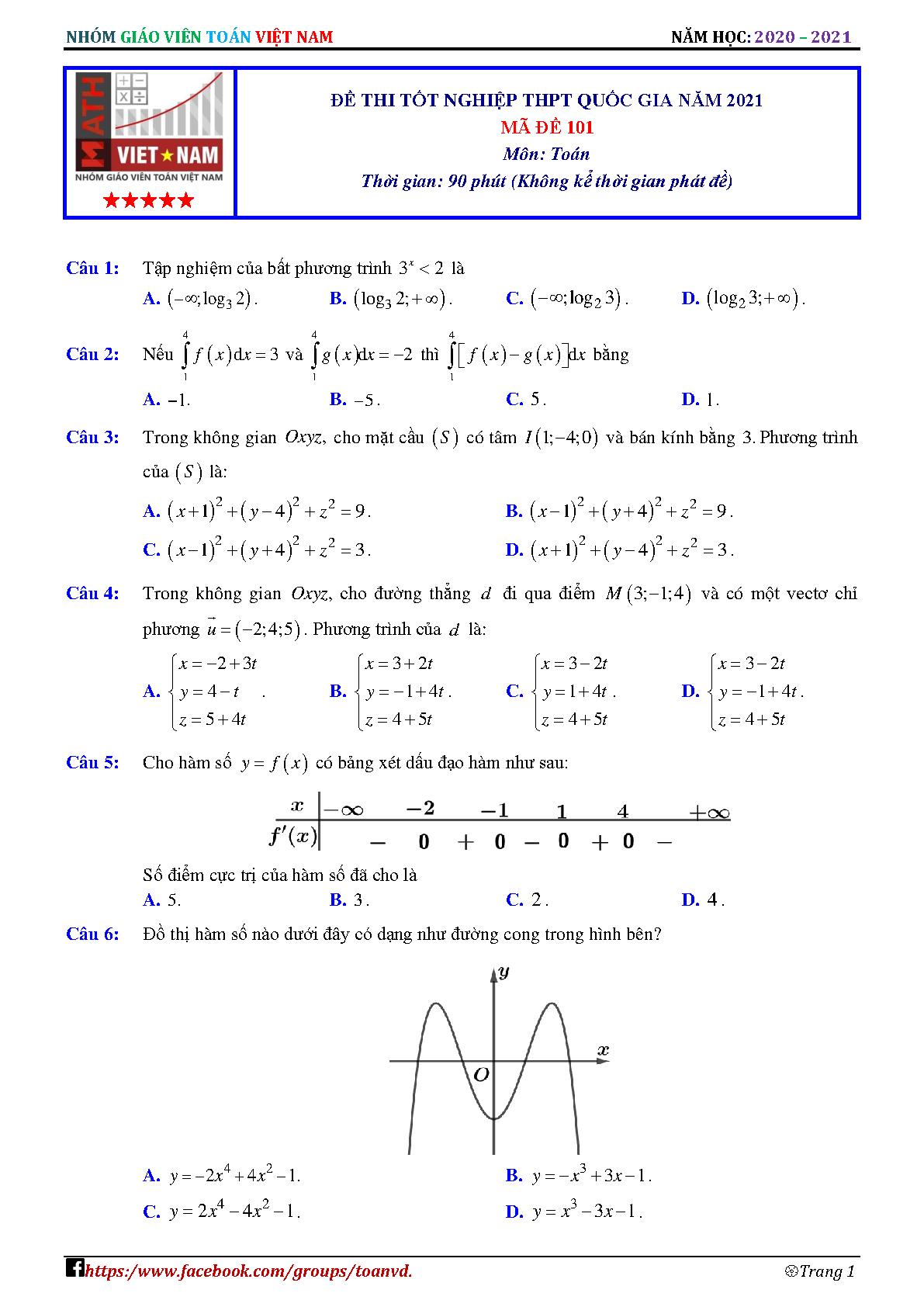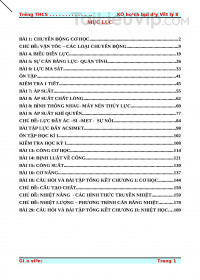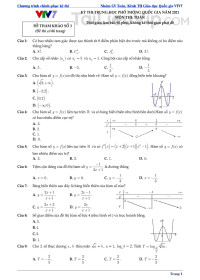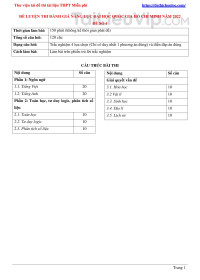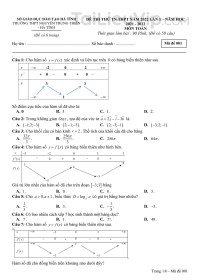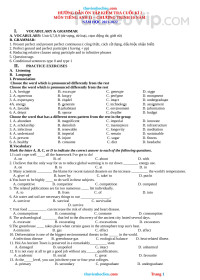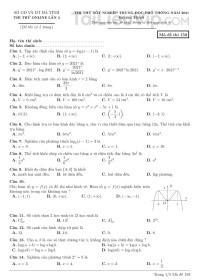TRẠNG TỪ TRONG TIẾNG ANH (ADVERBS) (Lý thuyết và bài tập vận dụng đa dạng)
1,577 4

Tải về máy để xem đầy đủ hơn, bản xem trước là bản PDF
Tags: #adverb#adjective#trạng từ trong tiếng anh#cách thành lập trạng từ#so sánh trong tiếng anh
Mô tả chi tiết
Chức năng của trạng từ (Functions of adverfos)
1.Bổ nghĩa cho động từ.
Ex: He speaks English fluently.
trạng từ “fluently” bổ nghĩa cho động từ “speaks”.
2.Bổ nghĩa cho tính từ.
Ex: I led a very pleasant life there.
trạng từ “very” bổ nghĩa cho tính từ “pleasant”.
3.Bổ nghĩa cho trạng từ khác.
Ex: She acts too badly.
trạng từ “too” bổ nghĩa cho trạng từ “badly”.
4.Bổ nghĩa cho cả câu.
Ex: Luckily, he passed the final examination.
trạng từ “luckily” bổ nghĩa cho cả câu “he passed the final examination”.
1.Bổ nghĩa cho động từ.
Ex: He speaks English fluently.
trạng từ “fluently” bổ nghĩa cho động từ “speaks”.
2.Bổ nghĩa cho tính từ.
Ex: I led a very pleasant life there.
trạng từ “very” bổ nghĩa cho tính từ “pleasant”.
3.Bổ nghĩa cho trạng từ khác.
Ex: She acts too badly.
trạng từ “too” bổ nghĩa cho trạng từ “badly”.
4.Bổ nghĩa cho cả câu.
Ex: Luckily, he passed the final examination.
trạng từ “luckily” bổ nghĩa cho cả câu “he passed the final examination”.

Nội dung
ADVERBS (TRẠNG TỪ)Trạng từ là từ dùng để diễn tả tính cách, đặc tính, mức độ, ... và được dùng để bổ nghĩa cho động từ,tính từ, trạng từ khác hoặc cho cả câu.I. Hình thức của trạng từ (Forms of adverbs)Trạng từ có thể là:1. từ dơn: very (rất, lắm), too (quá), then (lúc đó),...2. tính từ + ly: slowly (một cách chậm chạp), clearly (một cách rõ ràng),...3. từ kép: everywhere (khắp nơi), sometimes (đôi khi),...4. cụm từ: at the side (ở bên), at first (thoạt tiên, trước hết), the day after tomorrow (ngày kia),...II. Phân loại trạng từ (Classification of adverbs)Trạng từ được phân loại dựa vào nghĩa của nó.1. Trạng từ chỉ thể cách (adverbs of manner): cho biết hành động diễn ra cáchnào, ra sao. Ex : He works carefully .She sings beautifully .- Trạng từ chỉ thể cách thường được thành lập bằng tính từ + ly . Ex : badly, quickly, deeply,...- Một số trạng từ có cùng hình thức với tính từ.Ex : hard (chăm chỉ, siêng năng), fast (nhanh), early (sớm), late (trễ)Lưu ý:hardly (adverb): rất ít, hầu như không, khó lòng.Ex : I’m not surprised he didn’t find a job. He hardly tried to find one.(Tôi không ngạc nhiên khi anh ấy không tìm được việc. Anh ấy hầu như không cố gắng để tìm.)lately (adverb): gần đâyEx : He has come to see me lately. (Gần đây anh ấy có đến thăm tôi.)2. Trạng từ chỉ thời gian (adverbs of time): cho biết hành động diễn ra lúc nào.now (bây giờ), then (lúc ấy), yesterday (hôm qua), tomorrow (ngày mai), soon (chẳng bao lâu),immediately (ngay lập tức),...Ex : Can you do it now ?What’s going to happen next ?3. Trạng từ chỉ nơi chốn (adverbs of place): cho biết hành động diễn ra nơi nào.along (dọc theo), around (quanh), where (ở đâu), somewhere (đâu đó), here (ở đây), there (ở đó),through (xuyên qua),...Ex : She came here just a few minutes ago.Where are you going?4. Trạng từ chỉ sự tần suất (adverbs of frequency): cho biết sự việc xảy ra thường xuyên như thế nào. always (luôn luôn), usually (thường), often (thường), sometimes (đôi khỉ, thỉnh thoảng), seldom(hiếm khi), never (không bao giờ),...Ex : He always does his work well. She hasnever done that before.Các trạng từ này thường đứng trước động từ thường ( go, hear ,…) đứng sau động từ đặc biệt (be, can,…) đứng giữa trợ động từ và động từ chính.Ex : He is constantly in debt.Mary sometimes goes to the cinema with Tom. He has ever been there.5. Trạng từ chỉ mức độ (adverbs of degree): diễn tả mức độ (rất, ít, nhiều...) của một tính chất hoặc đặc tính.too (quá), absolutely (tuyệt đối), extremely (vô cùng), nearly (gần như), very (rất),...Ex : I’m very pleased with your success.I’m terribly sorry I’m late.6. Trạng từ nghi vấn (interrogative adverbs) được dùng để đặt câu hỏi.where (ở đâu), when (khi nào), how (cách nào) , why (tại sao), what (cái gì), ...Ex : Why did you say that?How did you come here?III. Chức năng của trạng từ (Functions of adverfos)1. Bổ nghĩa cho động từ.Ex : He speaks English fluently . trạng từ “fluently” bổ nghĩa cho động từ “speaks”.2. Bổ nghĩa cho tính từ.Ex : I led a very pleasant life there. trạng từ “very” bổ nghĩa cho tính từ “pleasant”.3. Bổ nghĩa cho trạng từ khác.Ex : She acts too badly. trạng từ “too” bổ nghĩa cho trạng từ “badly”.4. Bổ nghĩa cho cả câu.Ex : Luckily , he passed the final examination. trạng từ “luckily” bổ nghĩa cho cả câu “he passed the final examination”.♦ Một số cách dùng của trạng từ so- So được dùng để thay thế cho lời phát biểu trước đó.Ex : “Will he do it?” “I think so .”“Will they ask you to do it?” “I don’t think so .”- So được dùng với động từ to do để nói đến động từ ở trước đó.Ex : I told him to come and see me the next day, and he did so .If they want me to help you, I will do so .- So = also (cũng vậy) thường thấy trong cấu trúc: so + auxiliary verb + noun.Ex : My brother is fond of pop-music and so is his wife .I like to drink coffee and so does Lan .IV. Phép đảo chủ ngữ và động từ sau các trạng từ (inversion of subject and verb after adverbs)Phép đảo động từ là sự đảo ngược vị trí giữa trợ động từ và chủ ngữ. Nếu là động từ đặc biệt thì đảo động từ ấy ra trước chủ ngữ và nếu là động từ thường thì phải mượn trợ động từ to do.Hình thức đảo ngữ được dùng sau trạng từ khi:1. Trạng từ hay trạng ngữ được đặt đâu câu với dụng ý nhấn mạnh.Ex : Never does my father drink coffee in the evening. (Không bao giờ bố tôi uống cà phê vào buổi tối.) Twice within in my lifetime have world wars taken. (Hai lần trong đời tôi đã chứng kiến thế chiến diễn ra.)2. Trạng từ hay trạng ngữ phủ định đứng đầu câu.Ex : In no circumstances would I agree to such a proposal (Không đời nào tôi lại đi chấp thuận một đề nghị như thế.) Nowhere else will you find such a kind man.(Không ở đâu anh có thể tìm thấy một người tử tế như thế.)3. Trạng từ only đứng đầu câu và không ám chỉ chủ ngữ của câu.Ex : Only with the full agreement of everyone can we hope to succeed.(Chỉ khi có được sự đồng ý hoàn toàn của mọi người chúng ta mới có thể thành công.)EXERCISESI. Choose the correct words.1. Rita plays the violin (good/ well).2. That is an (intense/ intensely) novel.3. The sun is shining (bright/ brightly).4. The boys speak Spanish (fluent/ fluently).5. The table has a (smooth/ smoothly) surface.6. We must figure our income tax returns (accurate/ accurately).7. We don’t like to drink (bitter/ bitterly) tea.8. The plane will arrive (soon/ soonly).9. He had an accident because he was driving too (fast/ fastly).10. Your cold sounds (terrible/ terribly).11. They became (sick/ sickly) after eating the contaminated food.12. I always feel (happy/ happily) when the sun is shining.13. You look (terrible/ terribly)! Are you all right?14. There’s no point in doing a job if you don’t do it (proper/ properly).15. Please keep (quiet/ quietly)! I’m learning my lessons.16. We didn’t go out because it was raining (heavy/ heavily).17. You should make your clothes (clean/ cleanly) when you go out.18. Rose is (terrible/ terribly) upset about losing her job.19. Linda likes wearing (colourful/ colourfully) clothes.20. I think you behaved very (selfish/ selfishly).II. Complete each sentence using a word from the list. Sometomes you need the adjective and sometimes the adverb.careful(ly) complete(ly) continuous (ly) financial(ly) fluent(ly) happy(ly)nervous(ly) perfect(ly) quick(ly) special(ly)1. Our holiday was too short. The time passed very .2. Tom doesn’t take risks when he’s driving. He’s always .3. Sue works . She never seems to stop.4. Alice and Stan are very married.5. Monica’s English is very although she makes quite a lot of mistakes.6. I cooked this meal for you, so I hope you like it.7. Everything was very quiet. There was silence.8. I tried on the shoes and they fitted me .9. Do you usually feel before examinations?10. I’d like to buy a car but it’s impossible for me at the moment.III. Choose two words (one from each group) to complete each sentence.+ absolutely - seriously - unusually - completely - unnecessarily - reasonably+ changed - ill - enormous - quiet - long - cheapEx : I thought the restaurant would be expensive but it was reasonably cheap .1. George’s mother is in hospital.2. What a big house! It’s .3. The children are normally very lively. Today they are .4. When I returned home after 20 years, everything had .5. The film was . It could have been much shorter.IV. Are the underlined words right or wrong? Correct them where necessary.1. I tried hard to remember her name but I couldn’t.2. This coat is practically unused. I’ve hardly worn it.3. She’s a good tennis player. She hits the ball hardly .4. Don’t walk so fast . I can’t keep us with you.5. Why are you walking so slow ? Are you tired?V. Complete the sentences. Use hardly + the following verbs (in the correct form).chance - hear - know - say - sleep1. George and Hilda have only met once before. They each other.2. I’m very tired this morning. I last night.3. You’re speaking very quietly. I can you.4. You look the same now as you looked 15 years ago.You’re .5. Kate was very quiet this evening. She a word.VI. Rewrite the sentences, beginning with the underlined words. Make any neccessary changes.1. She rarely smiles at me.2. I had n’t known her until he told me.3. You will hardly finish your work before it’s dark.4. You can buy this book only in this shop .5. My teacher is no longer teaching in this school.6. She has never seen such a beautiful sight.7. This rich man seldom helps the poor.8. She never in life felt happy.9. People did not discover AIDS until 1981 .10. Martin had no sooner sat down than the telephone rang.11. The lost child could be found nowhere .12. I got no help from him.13. He not only refused to help me but he also laughed at me.14. He never smokes in bed.15. She has make good progress only within two months .16. You should not travel alone under any circumstances .17. It is hot enough to sit outside only in summer . 18. It is seldom wise to say too much about oneself.19. He found a job nowhere after he had graduated from college .20. I know little about computer.
- Xem thêm -


